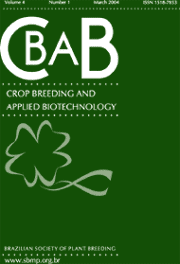Estimating genetic parameters is an essential procedure to define strategies for breeding and selection of higher yielding genotypes. The use of a selection index can assist in decision making by combining the high yield trait with other desirable traits. The objective of this study was to verify the possibility of gains from selection in a sweet potato population to select potentially promising genotypes. The experiment was conducted in a randomized block design, with three plants per plot and two replications, consisting of 255 sweet potato genotypes and a commercial cultivar (256 treatments). The data were analyzed through REML/BLUP. Genetic gains were evaluated using selection indexes based on the rank sun. The plant population tested showed high genetic variability; 81.25% of the traits had genotypic coefficients of variation above 20%, which indicates conditions favorable to selection with considerable genetic advances. CERAT31-01, CERAT21-02, and CERAT51-30 can be recommended as the most promising genotypes.
Genetic parameters and gain from selection in sweet potato genotypes with high beta-carotene content
Citation: Otoboni, M. E. F., Oliveira, D. J. L. S. F., Vargas, P. F., Pavan, B. E., & Andrade, M. I. (2020). Genetic parameters and gain from selection in sweet potato genotypes with high beta-carotene content. Crop Breeding and Applied Biotechnology. ISSN: 1984-7033. 20(3), 9 p.
2021-03-15
GENETIC RESOURCES, GENETICS, GENOMICS AND CROP IMPROVEMENT SCIENCES GGCI, NUTRITION, SWEETPOTATO AGRI-FOOD SYSTEMS, SWEETPOTATOES
journal_item

